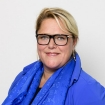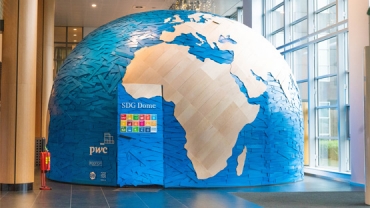
SDG coordinator Sandra Pellegrom: 'The Netherlands can be a pioneer'
19/12/19
NextGen SDG Experience - inspiring the next generation
Sandra Pellegrom has been the national SDG coordinator for more than three months now. When it comes to achieving the UN’s sustainable development goals, she is positive about the opportunities in the Netherlands. ‘The agenda for 2030 is shared between many parties in society. I also experience a lot of enthusiasm in the business world. I see an increasing sense of solidarity. Like: it’s a joint effort to make sure the world becomes more sustainable. The SDGs offer a concrete, shared agenda for that, and that appeals to people.
Pellegrom is impressed by the creative initiatives she came across in her first months as SDG coordinator. The former diplomat attends many meetings and conferences about sustainability, equality and poverty reduction. She was also present at the launch of the SDG Experience for children at the PwC office in Amsterdam. The SDG Experience is an interactive way to inspire people and organizations to take action on the UN’s sustainable development goals. Through a game, the participants learn how new technology can provide solutions to major global problems and how they can contribute themselves in their daily lives.

SDG coordinator Sandra Pellegrom (left) and PwC board member Renate de Lange together with several schoolchildren at the launch of the NextGen SDG Experience.

Embracing SDGs for a better world
Pellegrom visibly enjoyed the enthusiasm of the invited schoolchildren during the opening. ‘This will be the generation that will have to take action it. If they don’t embrace the SDGs, we won’t make the goals. The targets are in place until 2030, the children will be adults by then. The UN’s agenda aims to have a better starting position for the world in ten years time. The negative trends we experience now, such as increasing pressure on our planet’s resources and raising inequality, must then be turned into positive trends. If we don’t start with that turnaround now, the current teenagers will be stuck with all the problems. That’s why they have to make themselves heard now. It was very nice to talk to them about how they can inspire their parents, for example.’
-The question is whether we will meet the targets in the Climate Agreement. Especially with the current criticism from various angles. How optimistic are you?
‘If we want to achieve the sustainable development goals, something will have to change in our way of doing business and living. The Climate Agreement is an important example, but the goals go beyond becoming more sustainable. For example, it also is about ensuring that everyone can continue participating in society, is able to find good work and develop their competencies. And change is never easy. But I am certainly hopeful. As far as the SDGs are concerned, we are doing quite well in the Netherlands. When it comes to the environment and women’s equality, we certainly have to make some progress in the coming years, but we are a very innovative country, with good education. And, perhaps even more importantly, I see a lot of enthusiasm in the business world. Most companies are aware that things must be done differently. They also increasingly see this change as an opportunity: we have to adapt to the changing world, and we could be a pioneer in this as well.’
‘If we want to achieve the sustainable development goals, something will have to change in our way of doing business and living. It also is about ensuring that everyone can continue to participate in society, is able to find good work and develop themselves.’
-Where do you see the bottlenecks?
This change is not that easy for all companies. After all, you have to start thinking about your business model and your future in a different way. For example, you must invest in things that don’t actually return anything within a year, but perhaps only in five or ten years. Things that also seem a little less tangible: your role in society, the appreciation of customers. There is nothing wrong with making a profit, as a company has to exist. But companies also have an interest in a future-proof world and have a direct influence on it. I notice that they sometimes find it difficult to put their hands on it. SMEs, for example, would like to, but are often searching for answers.
-Which role could the government play in this?
The government asks companies to do business socially responsible. This way, companies can contribute to the SDGs. Collaboration and partnerships around the SDGs can help companies make that step. In the Dutch way of decision-making, we work very bottom-up. So as a government, we will sit down with all parties involved to come to a joint plan. We have seen this, for example, in the case of the Netherlands circular in 2050. If there is a plan, the government drives the implementation and takes the necessary steps on the policy side. When it comes to the SDGs, it is my role to get the desired parties to talk to one another and establish partnerships, especially between parties who usually might not find each other immediately. With the aim of helping to implement all good ideas. Fortunately, I do not have to do this on my own, but work together with the SDG Netherlands network, in which important business syndicates are also active.’
- And which role could companies like PwC play?
Companies have a lot of influence on society, on what citizens experience too. That’s why companies must show their willingness to help tackle problems in society. A company like PwC shows clients how to do this by pursuing SDGs themselves, but also by helping clients do so. As a consultancy firm, you undoubtedly get questions from clients about becoming more sustainable. Then the connection to the SDGs is easily made. This connecting role is important, looking at the potential we have in the Netherlands. I notice that many parties are willing to help with the desired transformation. Everyone is gradually realising we simply have to get started. The longer we postpone this, the greater the chance we are starting to lag behind other countries. In the Netherlands, we have the strength to be a pioneer, but then we must get started now.

Contact us


Wineke Ploos van Amstel - Haagsma
Chief Sustainability Officer, PwC Netherlands
Tel: +31 (0)65 170 13 44

















